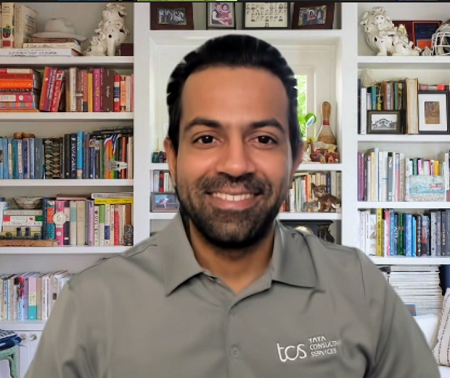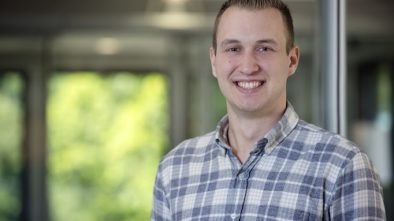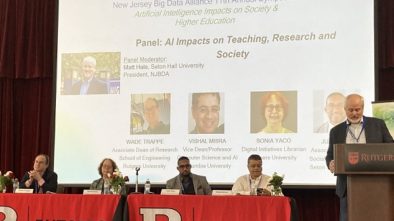TCS to Hire 1,000 More Tech Professionals in New Jersey. Where Will They Find Them? How Will It Work? Vivek Ravichandran Tells Us
When Tata Consultancy Services (TCS), whose Edison Business Center serves more than 100 customers in New Jersey, announced that it would bring 1,000 more jobs here and increase its STEM investments in the state, we wanted to know more. The company already has 3,700 employees in New Jersey.
We spoke with Vivek Ravichandran, the head of talent development for TCS in North America. Ravichandran is based in New Jersey. His primary responsibility includes ensuring that adequate tech and soft skills are imparted to TCS employees in North America. He also actively works with graduates from colleges and oversees their hiring.
Here are some of his insights:
ES: Why is TCS increasing its hiring in New Jersey?
VR: New Jersey is very important to TCS. We have a big customer base in the New Jersey/New York region. As far as employees go, we have many who are based in this area. Most of our employees are high-tech professionals. We see a lot of demand in areas like cloud, AI [artificial intelligence], machine learning—these kinds of skills that the industry is leaning towards. I believe we will be hiring a lot of Java developers and people who possess modern digital skills.
ES: Do you think TCS will be affected by the tight hiring market for tech professionals in New Jersey?
VR: We see a very strong interest from the talent pool to apply for the jobs that are available in TCS. I think this is because of the very strong brand that TCS carries. Also, the company looks at people as its biggest strength. A testimony to this is the fact that, even during tough times like now, our attrition rates are probably among the lowest in the industry. Also, when I see the number of applicants for each job, I feel confident that we won’t be afflicted by the talent shortage.
But what gives me even more confidence is our ability to train these people. Let’s say we need you to have 10 skills, and you have seven or eight and you’re reasonably good at them, we are confident that we can absorb you, give you enough skills, bridge that gap without any problem and make you an asset for TCS to go deliver to our customers. We have a very clear understanding of the skill inventory that a person needs to have, so that they can contribute to the delivery of our projects to our customers.
People who come into the company have access to a plethora of learning resources, any course on LinkedIn Learning and any course on Udemy. Apart from that, we ourselves have a bunch of AI-driven learning platforms. All of these together today can give you a curated AI-driven learning journey, custom made for you. Let’s say we need you to be a data scientist. Based on the skills that you currently possess, our systems can actually tailor the learning path for you and say, “Hey, so today, from where you are, this is what you need to do to be the data scientist that I want you to be.”
ES: Making training available is one thing, but many of your employees actually complete their courses. What’s special about what you do?
We’ve broken this down into small nuggets that you can do in a short time. We call it “micro learning.” You can even consume 10 minutes, 15 minutes a day for five months, and go through this learning journey. We meet people where they are.
We did a lot of number crunching and figured out that people who have consistent learning patterns — such as logging online 20 minutes each night before bed — learn way more than people who have sporadic learning patterns. So today the system focuses on bringing you to the learning platform so that you will at least spend 20 minutes a day. It is gamified to incentivize this. Those who learn consistently receive currencies called miles and credits that we give out. Sometimes we’ll increase the number of “miles” they can earn. They can exchange these for quantified benefits that are defined by the company in its employee rewards and recognition framework. So, we have primary incentives, our ability to enable career growth for people who learn these skills and secondary incentives such as the “miles.”
ES: Why does the company have such an elaborate employee training program?
These mechanisms drive our ability to be confident that we can hire people en masse, train them, retrain them and make them fungible. We can train them for a position today, and tomorrow if I need them to learn something else, I can be confident that this person won’t become redundant. I have a machinery that can transform this person from a one-dimensional person to a multidimensional person, which I can use across the whole company.”
ES: TCS is one of the few tech consultancy companies we’ve run across that hires out of college. What universities in New Jersey do you look at most? And how are you able to do this?
We hire from a number of New Jersey colleges and universities, including Rutgers and NJIT. While hiring out of college represents just a fraction of our hires, it is very important to our strategy. This workforce is a very, very important workforce for us because it helps us reskill a lot of our middle level employees to upgrade their jobs.
Ten years back, if you needed to run a mainframe development project, you might need 100 mainframe architects to run that project. But today, it can be run by a few architects. There is an increased need for generalists, people with adequate depth of knowledge in more than one skill. So, these fresh graduates have picked up many of the skills we need as part of their curriculum, and it gives us a strong base to help them pick up adjacent skills. When the new graduates come in, a lot of people who have been in similar roles for a while and have acquired contextual knowledge are able to move up. They’ve been in the ecosystem, and they’ve been learning. So, they are qualified for higher-level jobs. The fresh graduates can come into their vacated places.
For anybody coming in, we invest about 12 weeks of immersive hands-on learning across skills where we have demand. It could be cloud, it could be full-stack development, it could be AI, it could be machine learning, it could be data analytics. We have a bunch of these streams in which we run 10- to 12-week immersive hands-on clinics. We believe that these recent graduates can absorb learning like a sponge and also bring in new perspectives.
ES: Talk to us about how TCS strengthens the STEM ecosystem in New Jersey.
We have two flagship programs that foster innovation and career readiness. TCS’ go Innovate Together (goIT) program, a STEM training initiative, fosters digital innovation and career readiness. This program has impacted over 42,000 students in the U.S. and Canada, including more than 870 students in New Jersey at 25 unique events in 2021. Overall, more than 2,900 students in New Jersey have engaged in goIT programming, through teaching curriculums and other programs, such as CSEdWeek and STEM Career Accelerator Day. In August 2021, TCS also celebrated the culmination of a month-long goIT STEM Camp with the Edison, New Jersey, Board of Education, with 350 students participating.
TCS’ Ignite My Future in School, a pioneering, transdisciplinary program for K-12 education, helps educators embed computational thinking into core subjects such as math, science, language arts and social studies. Since its launch in 2017, Ignite My Future has reached 26,300 educators and 1.55 million students across North America. To date, we have partnered with more than 375 school districts and nonprofit partners. In 2021, TCS supported New Jersey teachers and students through two TECHademy events, which are professional development sessions for educators from school districts across the state.
The TCS goIT and Ignite My Future in School programs are open to any schools that are interested in participating. TCS relies on a variety of channels to reach educators: word of mouth among teachers in our network, proactive outreach, government relations initiatives, TCS employee volunteer programs, and proactive engagement by our own employees. Since TCS has a particular focus on students traditionally underrepresented in STEM careers, we do research on states and cities to see which may have the greatest need and/or have new laws or mandates around computer science standards.




